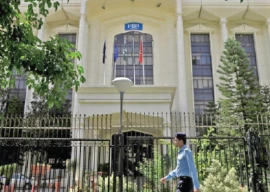
First developed in Australia in the 1970s, permaculture is still a relatively new concept around the world. It is a way of creating sustainable food production by employing natural design patterns to create highly productive organic gardens that can enhance soil fertility, restore biodiversity and enable year-round access to fresh fruit and vegetables.
Although North America and European countries are slowly taking stock in such sustainable development, Pakistan has strong potential but awareness is needed says one of the pioneering permaculturists in Islamabad, Ali Tariq. He first became interested in permaculture while living in California – one of the latest hubs of sustainable farming – and has recently spent four months in Northern Thailand studying it at Panya Project.
Currently, he has proposed an idea to Dost Foundation to apply permaculture style systems to local communities throughout KPP. The foundation is carrying out surveys to focus on the needs felt by the community. Thus far, they have narrowed their vision to kitchen garden demonstrations, compost methodology/soil fertility trainings combined with water management strategies.
Tariq notes that Islamabad is especially fertile for permaculture given its favourable climate, expanse of greenery and high literacy. “There are so many people with spacious gardens and houses in Islamabad, especially around Baro-koh and Chak Shazad but people still equate growing fruits and vegetables as a poor man’s practice”.
He further says if these wealthy individuals can be sensitised on the merits of growing their own produce they will not only benefit the community but themselves as well. By making rooftop gardens, small fruit orchard and kitchen garden, Tariq says, an interactive growing community can be formed around the city leading to greater efficiency and self-reliance. “By taking more responsibility individuals can create a more intimate relationship with food,” added Tariq.
Playing a part in sustainable development can be enjoyed by companies, working and middle class by utilising greywater systems which decreases the water waste in every day chores such as dish washing, bathing and laundry. If collected using a separate plumbing system from blackwater, domestic greywater can be recycled directly within the home, garden or company and used either immediately or processed and stored.
Darcy Walter a proactive permaculturist working in Toronto also agreed on the merits of utilising greywater systems saying, “Water is a major component of sustainable development and if most households recycled water on a daily basis the threat of water shortage would decrease a sizable amount.”
He further noted that installing these systems or even making one’s own is not as time and money consuming as other forms of permaculture.
Another cheap, effective and easy tenet of permaculture that is growing quote popular in North America is composting, said Walter. Compost is organic matter that has been decomposed and recycled as a fertiliser.
Published in The Express Tribune, August 6th, 2012.


1731574647-0/BeFunky-collage-(58)1731574647-0-165x106.webp)
1731573461-0/BeFunky-collage-(57)1731573461-0-165x106.webp)
1722585575-0/BeFunky-collage-(22)1722585575-0-165x106.webp)












COMMENTS
Comments are moderated and generally will be posted if they are on-topic and not abusive.
For more information, please see our Comments FAQ